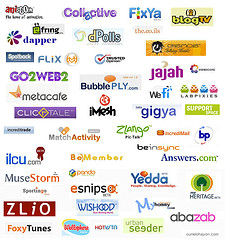 According to webware, tech-support startup Fixya will announce a partnership with Best Buy whereby “customers wanting to perform their own fixes (or trying to dig others out of trouble) can go to the Best Buy Web site and access http://geeksquad.fixya.com from the “Customer Service” tab. They can search by product, SKU, manufacturer, or product category, or post a new query and receive community troubleshooting” for free. This is sure to boost traffic on Fixya’s site, which already claims over 6 million views per month. The site also boasts more than 30,000 “geek” contributors.
According to webware, tech-support startup Fixya will announce a partnership with Best Buy whereby “customers wanting to perform their own fixes (or trying to dig others out of trouble) can go to the Best Buy Web site and access http://geeksquad.fixya.com from the “Customer Service” tab. They can search by product, SKU, manufacturer, or product category, or post a new query and receive community troubleshooting” for free. This is sure to boost traffic on Fixya’s site, which already claims over 6 million views per month. The site also boasts more than 30,000 “geek” contributors.
 InterCure Ltd., a medical device company (TASE: INCR), announced yesterday that its RESPeRATE hypertension treatment device, clinically-proven to
InterCure Ltd., a medical device company (TASE: INCR), announced yesterday that its RESPeRATE hypertension treatment device, clinically-proven to  significantly lower blood pressure, will launch into full-scale retail distribution in the UK this May through leading pharmacy chain Lloyds.
significantly lower blood pressure, will launch into full-scale retail distribution in the UK this May through leading pharmacy chain Lloyds.
“The full-chain launch of RESPeRATE at Lloyds Pharmacy clearly demonstrates the broad appeal of our effective and truly natural device-guided breathing therapy for hypertension,” said Erez Gavish, president and CEO of InterCure. Sixteen million adults in the UK suffer from high blood pressure. Left untreated, it may lead to heart attack, stroke and kidney or heart failure.
Founded in 2005 and based in Ness Ziona, Perytons provides developers, implementers and field engineers with analyzers for standard and proprietary wireless communication protocols. The startup announced today an enhanced version of it’s multi-antenna multi-channel 802.15.4/ZigBee analyzer based on Integration Associates EZLink 802.15.4 USB dongles. The tool provides the capability to analyze and track multiple network sessions that coincide in time in a user friendly manner. “We are excited to provide our customers a feature rich, user friendly analysis tool with very high reliability needed for analyzing sophisticated wireless networks.” – Yaron Soffer, Perytons Founder and CEO.
developers, implementers and field engineers with analyzers for standard and proprietary wireless communication protocols. The startup announced today an enhanced version of it’s multi-antenna multi-channel 802.15.4/ZigBee analyzer based on Integration Associates EZLink 802.15.4 USB dongles. The tool provides the capability to analyze and track multiple network sessions that coincide in time in a user friendly manner. “We are excited to provide our customers a feature rich, user friendly analysis tool with very high reliability needed for analyzing sophisticated wireless networks.” – Yaron Soffer, Perytons Founder and CEO.
 Mazor Surgical Technologies, a 2001-founded provider of the SpineAssist, a miniature surgical assistance system for a wide range of spine procedures, has signed a strategic cooperation agreement with the Cleveland Clinic Foundation. Mazor has received exclusive, worldwide licenses to two patents for the development of permanent implants for the spine.
Mazor Surgical Technologies, a 2001-founded provider of the SpineAssist, a miniature surgical assistance system for a wide range of spine procedures, has signed a strategic cooperation agreement with the Cleveland Clinic Foundation. Mazor has received exclusive, worldwide licenses to two patents for the development of permanent implants for the spine.
 CEO Ori Hadomi predicts that the product, which has already undergone a feasibility study, can reach market within a year. He adds that the product will open a new market to the company – orthopedic implants – and that it can also boost sales of Mazor’s own SpineAssist product line.
CEO Ori Hadomi predicts that the product, which has already undergone a feasibility study, can reach market within a year. He adds that the product will open a new market to the company – orthopedic implants – and that it can also boost sales of Mazor’s own SpineAssist product line.
Finally, check out this Globes article about a Israel Venture Capital Research Center survey that shows that high tech start-ups in Israel have not been affected so far by a possible global slowdown, and that in fact venture capital funding is at a seven-year high.
Filed under: Biotech, Communications, Healthcare, Medical Devices, Medicine, Other, Software, Uncategorized, Web 2.0 | Tagged: cleveland clinic foundation, erez gavish, fixya, intercure, mazor, perytons, resperate | Leave a comment »



 Startech Early Ventures
Startech Early Ventures



 Since I’ve started this blog I’ve been amazed by how many start-ups actually come out of Israel. Everyday brings news of at least two or three start-ups raising millions of dollars in financing, or exiting to a multi-national company for hundreds of millions of dollars. For each one of these, there are hundreds more languishing behind closed doors quickly brewing up the next big internet widget, water-cleaning solution or life-saving technology.
Since I’ve started this blog I’ve been amazed by how many start-ups actually come out of Israel. Everyday brings news of at least two or three start-ups raising millions of dollars in financing, or exiting to a multi-national company for hundreds of millions of dollars. For each one of these, there are hundreds more languishing behind closed doors quickly brewing up the next big internet widget, water-cleaning solution or life-saving technology.



